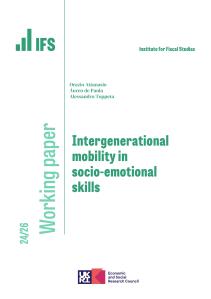Previous research has found that children who are born later in the academic year have lower educational attainment, on average, than children who are born earlier in the year, especially at younger ages; much less is known about the mechanisms that drive this inequality. The paper uses two complementary identification strategies to estimate an upper bound of the effect of age at test by using rich data from two UK birth cohorts. We find that differences in the age at which cognitive skills are tested accounts for the vast majority of the difference in these outcomes between children who are born at different times of the year, whereas the combined effect of the other factors (age of starting school, length of schooling and relative age) is close to zero. This suggests that applying an age adjustment to national achievement test scores may be an appropriate policy response to overcome the penalty that is associated with being born later in the academic year. Age at test does not, however, explain all of the difference in children's view of their own scholastic competence. Age adjusting national achievement test scores may help to overcome differences in ability beliefs between children who are born at different times of the year, but our results suggest that additional policy responses may be required.
This paper is available Open Access through generous funding from the ESRC.











